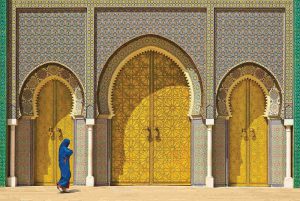Known as the “Door to the Sahara Desert,” Morocco and its great cities Casablanca, Tangier, and Marrakesh symbolize everything exotic about Arabic culture. The films “Gladiator,” “Lawrence of Arabia,” “Black Hawk Down,” and “The Last Temptation of Christ” were shot here.
Fes, Morocco. Courtesy of Peregrine Adventures.
There has been much change in Morocco, especially in the economy and government, since my last visit in 2007. Despite some charges of corruption and scattered protests, King Mohammed VI still remains popular among his 34 million subjects.
The king traces his blood line back to the prophet Mohammed, and his Alaouite dynasty has ruled this North African nation for 400 years. When he ascended the throne in 1999, he made a clean break with his father Hassan II, who, with the blessings of the CIA, tortured and killed thousands of his leftist political opponents.
In response to protests in 2011, King Mohammed agreed to give more power to the parliament and prime minister. He also decreed that Moroccan women would now have full social and political equality. In January 2017, he instructed authorities to ban the burqa, the clothing that has come to symbolize the suppression of women in Islam.
King Mohammed issued a decree that Moroccan men must limit themselves to two wives, down from the traditional limit of four. He has also ruled that women have a right to divorce, a right to sign the marriage contract, and the right to approve of a second wife.
It is ironic, and obviously a bit embarrassing to the king, that Princess Lalla Salma, his wife for 16 years, has now requested a divorce. She was a model for young Moroccan women: She did not cover her hair and she wore pant suits.
The Moroccan economy has expanded dramatically since my last visit. In addition to tourism as its mainstay, the country has increased its manufacturing sector. It has become an international hub for the aerospace industry with 110 companies participating, and 150 automotive plants are now operating in the country. As a result, personal wealth has increased 70 percent since 2000, and it was evident everywhere in more private cars, modern clothes and new homes.
Seeking to outpace its neighbor Algeria in solar energy production, Morocco is setting a goal of generating half of its energy needs from renewables by 2030. When the three-stage Noor facility at the edge of the Sahara Desert is completed, it will be the largest solar thermal plant in the world.
Problems, however, persist. Youth unemployment is 40 percent, and many cross the Straits of Gibraltar in unsafe boats to seek work in Europe. Although the king has made Berber an official language alongside Arabic, these proud non-Arabic mountain people are still not satisfied with their conditions.
Our driver was a Berber, and he did not recognize Mohammed as his king. He also blamed the Arabs and their oil money for all the world’s problems. He was convinced that the Saudi government was behind the Sept. 11 attack on the World Trade Center.
King Mohammed is determined to promote a moderate form of Islam, and he has joined forces with the U.S. in fighting Al Qaeda and the Islamic State. About 2,000 Moroccans went to Syria and Iraq to fight for the Islamic State, but when about 200 returned, they were immediately arrested. Since 2015, it now illegal for Moroccans to join and/or recruit others to join any recognized terrorist group.
In May 2003, suicide bombers killed 45 people in Casablanca. It was eight years before jihadists struck again, this time in the city of Marrakesh where 17 were murdered by remote controlled bombs.
The government now runs a successful surveillance campaign Operation Hadar in which security forces monitor suspicious activities. The publication of comic books with anti-terrorist themes directed at vulnerable youth has also been effective.
The teaching of fundamentalist Wahabi theology of Saudi Arabia has been banned in Morocco’s seminaries and universities, and Wahabi missionaries have been deported. As the head of both the state and the faith, King Mohammed has declared that no Muslim cleric can issue a fatwa (an Islamic legal opinion) without clearing it with him beforehand. Unregulated fatwas have caused confusion and arbitrary death sentences in other Muslim countries.
With King Mohammed’s blessing a new religious school has been established to train missionaries to spread a moderate form of Islam. So far about 1,000 have graduated, and that number includes 200 female “imams,” the equivalent of Christian parish priests. I wish these missionaries well, and I hope that they succeed in removing the unnecessary fear that so many non-Muslims feel.
Nick Gier of Moscow taught religion and philosophy at the University of Idaho. Read his columns on Islam at webpages.uidaho.edu/ngier/IslamPage.htm. Email him at [email protected]
